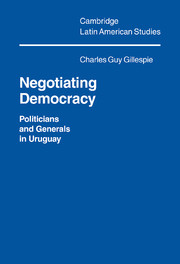Book contents
- Frontmatter
- Contents
- Foreword by Juan Linz
- Acknowledgments
- 1 Introduction: Political parties, theories of regime change, and the Uruguayan case
- PART I THE CRISIS AND SURVIVAL OF URUGUAYAN POLITICAL PARTIES
- PART II FROM AUTHORITARIAN CRISIS TO TRANSITION
- PART III POLITICAL PARTIES AND DEMOCRATIC CONSOLIDATION
- Conclusion: Parties and regime change – some lessons and comparisons
- Appendix
- Bibliography
- Index
- CAMBRIDGE LATIN AMERICAN STUDIES
1 - Introduction: Political parties, theories of regime change, and the Uruguayan case
Published online by Cambridge University Press: 11 September 2009
- Frontmatter
- Contents
- Foreword by Juan Linz
- Acknowledgments
- 1 Introduction: Political parties, theories of regime change, and the Uruguayan case
- PART I THE CRISIS AND SURVIVAL OF URUGUAYAN POLITICAL PARTIES
- PART II FROM AUTHORITARIAN CRISIS TO TRANSITION
- PART III POLITICAL PARTIES AND DEMOCRATIC CONSOLIDATION
- Conclusion: Parties and regime change – some lessons and comparisons
- Appendix
- Bibliography
- Index
- CAMBRIDGE LATIN AMERICAN STUDIES
Summary
This book examines a crucial case of democratic breakdown and rebirth that took place over the past generation in what was formerly the most stable democracy in Latin America. Uruguay's plunge into authoritarian rule seriously undermined the case for “Uruguayan exceptionalism” vis-à-vis the rest of Latin America that had pervaded the classic literature on the country. Yet if stable authoritarianism was to become the dominant regime type among Latin America's more advanced nations in the late twentieth century – as some pessimists predicted – Uruguay represented inhospitable soil, given its long democratic record.
There has never been a functioning democracy without political parties, and yet, ironically, parties usually play a key role in democratic breakdowns. Nowhere was that more true than in Uruguay, notwithstanding the widely held view that its democratic system fell victim to one or another kind of external assault during the 1960s and early 1970s. Uruguay experienced two decades of declining domestic production after the end of the Korean War boom, but despite increasing social strife, its democracy held up. Few democracies have faced such a deadly challenge. Uruguay's traditional parties, the Blancos and the Colorados, had long been firmly entrenched in the state, using its resources to strengthen themselves vis-à-vis rival power groups: foreign capital, domestic economic elites, and popular movements. However, their reliance on the historical “relative autonomy” of the political system weakened those parties once state resources began to dwindle as a result of prolonged economic stagnation.
- Type
- Chapter
- Information
- Negotiating DemocracyPoliticians and Generals in Uruguay, pp. 1 - 14Publisher: Cambridge University PressPrint publication year: 1991



